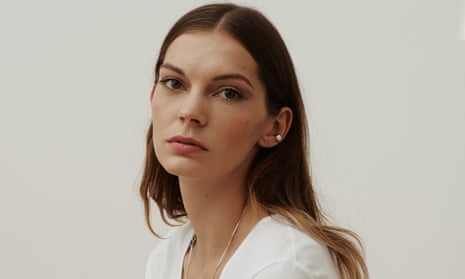London-based musician Rosie Lowe, 26, was born in Devon, the youngest of six children. She grew up in a basic wooden house built by her dad, keeping herself entertained (there was no TV) by learning six instruments. After completing a popular music course at Goldsmiths, she started making her own music – a languorous take on electronic soul (think Sade refracted by the xx). She has collaborated with Kwes and the Invisible’s Dave Okumu, and signed to producer Paul Epworth’s label in 2014. Her debut album, Control, is out on 19 February.
The Guardian’s product and service reviews are independent and are in no way influenced by any advertiser or commercial initiative. We will earn a commission from the retailer if you buy something through an affiliate link. Learn more.
You had quite a ‘back-to-nature’ childhood. How has that shaped you?
I think it’s made me grounded in a way I didn’t appreciate back then. It’s the same now when I go back – we have to chop wood and pick our own vegetables and stuff. You can’t drink the water. It makes you very patient – when I was writing the album there it was like a full-time job keeping the house warm.
As a woman, I think, I’ve got to be very much in control because I don’t want to be moulded
Was it difficult finding things in common with friends when they were all watching The OC and you were whittling spoons out of wood or whatever?
That was my favourite pastime! But you know what, no, it’s more of an issue now. I’m awful at a pub quiz. A lot of the time when I was younger I didn’t know if the musicians I was listening to were white or black or female or male. But that’s how I became so obsessed with music. That was my entertainment and it was also the way I learned to express myself.
You taught yourself the production software Logic at Goldsmiths...
I’d love to produce for others – that’s definitely a goal. And I never really wanted to be a frontwoman, it just sort of happened. I was writing a lot of music for myself and putting stuff up on Soundcloud for friends and then I got picked up. Although my dad does remind me that from five years old, I was saying I was going to be a singer.
Your songs deal very honestly with some serious issues: friendship breakdowns (Who’s That Girl), illness and feminism (Woman)...
It’s my debut so I figured that if I was ever going to be totally honest and vulnerable then now’s the time to do it. I think a huge part of our culture recently has been a conversation about feminism, which is great. There’s still a lot of negativity towards the word, but I do think it’s changing – people are seeing it as being about equality.I feel like the word just needs to be restated as often as possible.
You’re very open about the fact you see a therapist, but why do you think mental illness is still such a taboo subject?
I think it’s a little bit like feminism – it’s a loaded subject. A lot of my friends have gone to therapy since I’ve been open about going. Everyone should go. It’s a subject that needs to have more discussions around it and more support from the government. I’m 26 and I don’t know any of my friends who haven’t suffered from some sort of mental illness. We’re such complex and fucked-up beings, so I think it’s really necessary.
Explain the album title, Control?
Over the last few years I’ve been dealing with trying to relinquish control and trusting others with something that’s so personal to me. As a woman, I think, I’ve got to be very much in control because I don’t want to be moulded. I have a very specific vision and you have to fight hard for that in this industry.
When was the last time you had to compromise?
In my music? I haven’t really had to. I’m pretty sure about what I want and what I don’t.

Comments (…)
Sign in or create your Guardian account to join the discussion